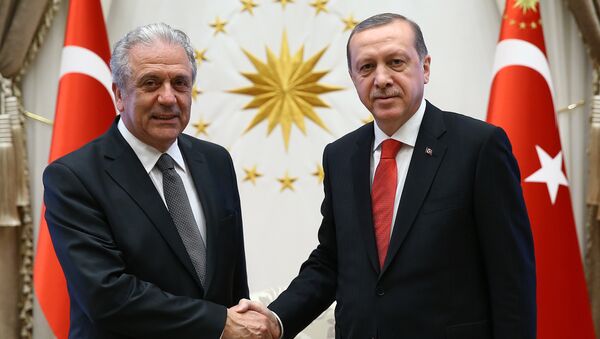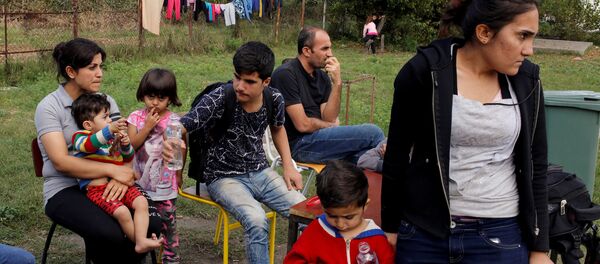Meanwhile, Avramopoulos has also delivered an upbeat report on the scheme to relocate 160,000 refugees from Greece and Italy around EU member states according to a quota system that has been widely slammed across Europe.
EU-Turkey Statement: state of play as of 28 September — Questions & Answers: https://t.co/fbsviwELSZ #refugeecrisis pic.twitter.com/Ag0p78x8Jc
— European Commission (@EU_Commission) September 28, 2016
Avramopoulos, September 28, delivered the latest report on the EU migrant crisis, covering two major policy decisions: the relocation plan and the EU-Turkey deal. His statement was upbeat on both, saying:
"All our measures on migration are interlinked. The EU-Turkey Statement has led to concrete positive results. The increased efforts made by member states over the past months on relocation, with more than 1,200 relocations alone in September, demonstrate that relocation can be speeded up if there is political will and a sense of responsibility," he said.
"The success of our common approach over the last months is essential for the success of everything else, including a gradual return to the Dublin system and a normal functioning of Schengen. Relocation has to succeed."
However, under the scheme to relocate 160,000 refugees from Greece and Italy to other member states under a mandatory quota system, agreed in September 2015, only 5,651 persons have been relocated.
#RefugeeCrisis: 5,651 relocations from Italy & Greece and 10,695 resettlements so far by EU countries https://t.co/bu6VNbK30F #MigrationEU pic.twitter.com/otO3h2C567
— European Commission (@EU_Commission) September 28, 2016
Shaky Deal
Meanwhile, the EU-Turkey migrant deal is also looking shaky. Under the deal, the EU was due to pay Turkey — initially — US$3.95 billion to bolster its refugee camps and accept "irregular" migrants denied asylum in Greece in return — on a one-for-one basis — for Syrian refugees in Turkey being relocated in the EU.
#MigrationEU: Factsheet on the EU Financial support to Greece https://t.co/vEd9QZQXbj pic.twitter.com/PUyTJcBpJ5
— EUHomeAffairs (@EUHomeAffairs) 28 September 2016
However, as part of the deal, the EU was supposed to grant Turkish citizens visa-free access to the EU by the end of July and accelerate its accession to becoming a full member of the EU, provided it meets more than 70 criteria relating to human rights and other administrative protocols.
The deal has run into serious opposition within the EU, following Turkish President Recep Tayyip Erdogan's crackdown on opposition groups, the media and human rights, which critics say make any talk of accession or visa-free access impossible, potentially plunging the deal into collapse.
6 months on since the #EUTurkey deal: "People cannot survive another six months of this misery" https://t.co/TBH4wLvvBq #Greece #refugees
— Sacha Myers (@sacha_myers) September 22, 2016
The UN Refugee Agency (UNHCR) and many leading refugee charities says the returning of refugees from Greece back to Turkey is against the Geneva Convention, as they believe Turkey is not a safe third country" because of its poor standards of refugee camps and treatment of refugees. In practice, only 578 people have actually been returned under the scheme.



